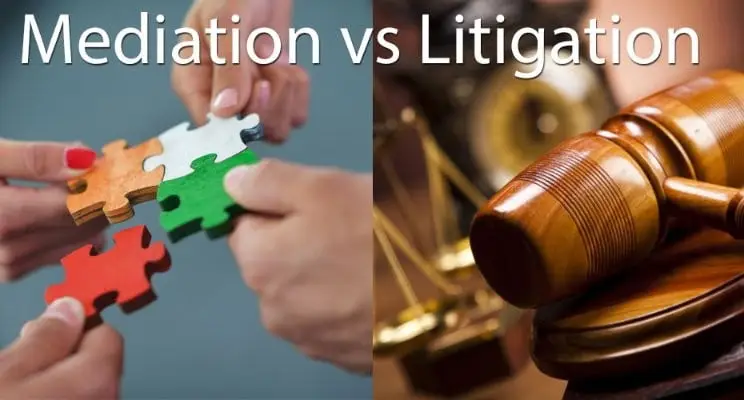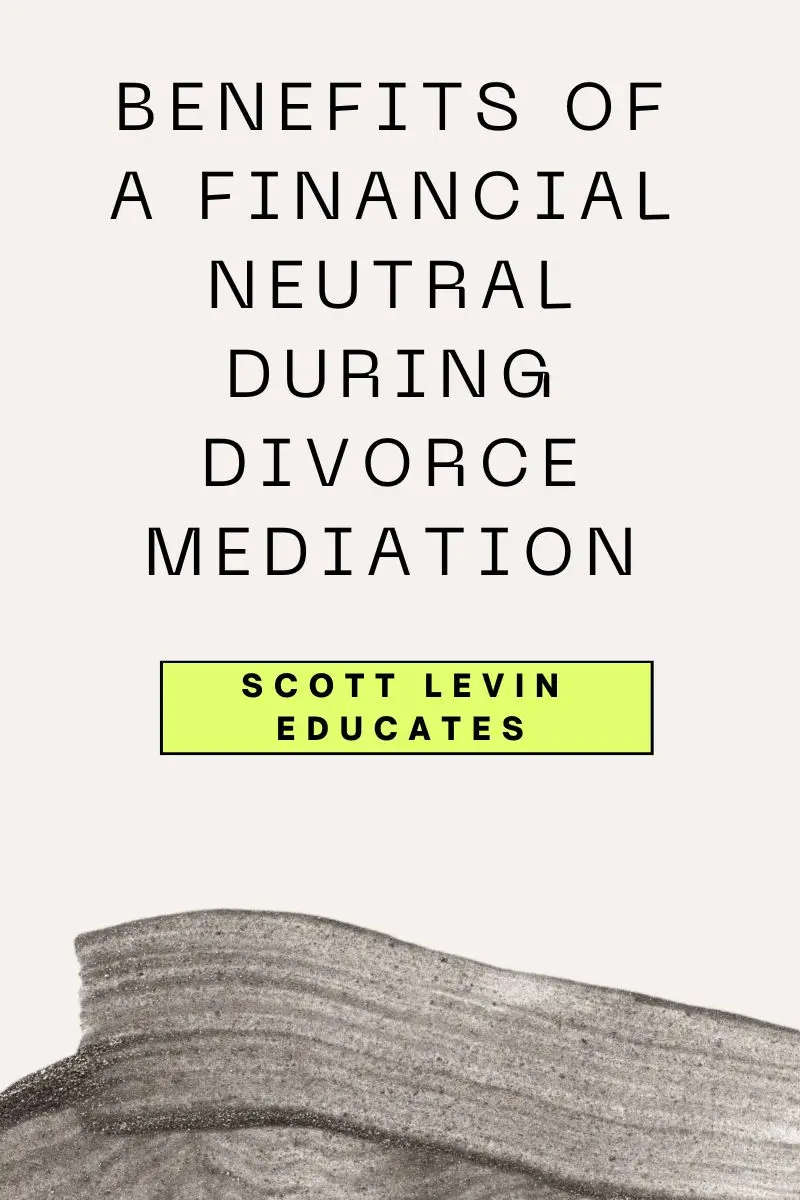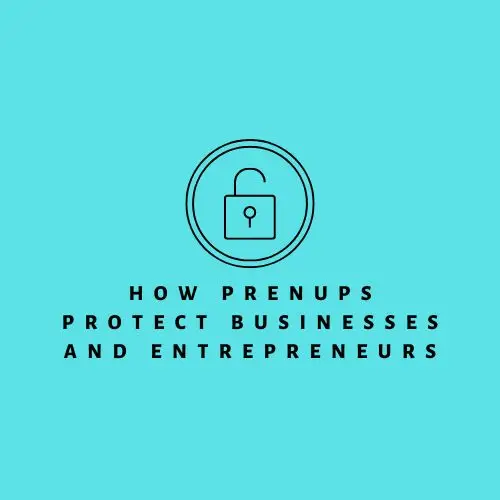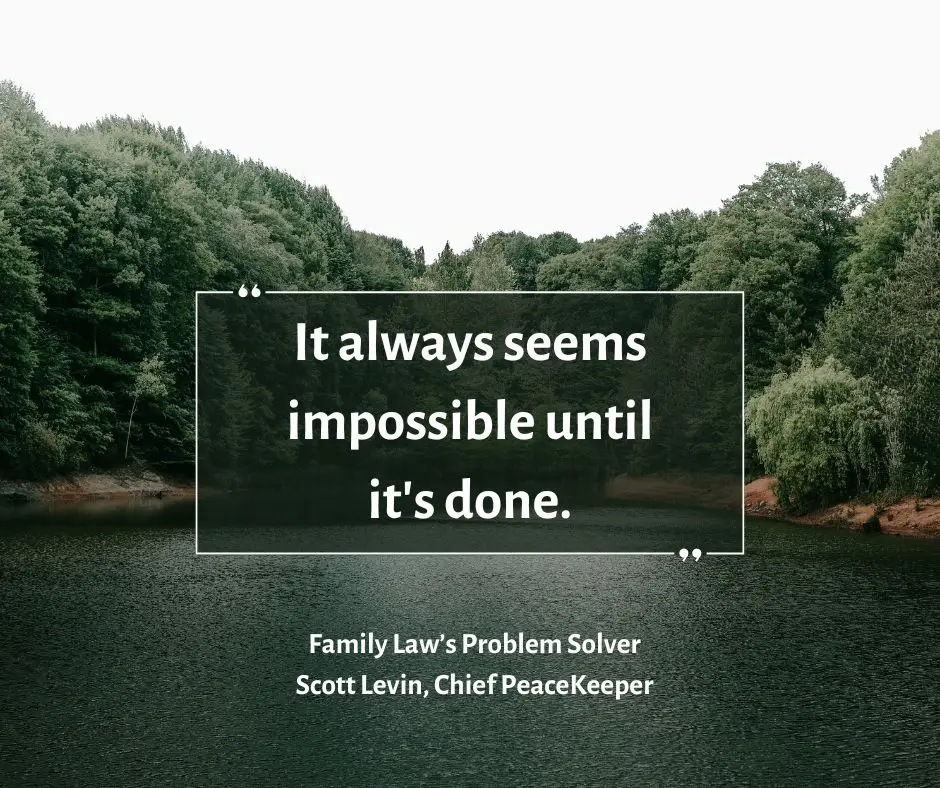Divorce Mediation vs Litigation
Are you going through a divorce and unsure whether to hire a mediator or a divorce attorney? Making the right choice is crucial as it can significantly impact the outcome of your divorce settlement.
Mediation vs Litigation Divorce INFOGRAPHIC
![Divorce Mediation vs Litigation [INFOGRAPHIC]](https://sandiegofamilylawyer.net/wp-content/uploads/2023/08/Divorce-Mediation-vs-Litigation-INFOGRAPHIC-1024x1024.webp)
In this article, we will explore the differences between hiring a mediator and a divorce attorney and help you determine which option is best suited for your unique situation.
What is a Divorce Mediator? Does a Mediator Help My Divorce?
Ever wondered about the difference between a divorce mediator and attorney? Let’s clear up the confusion and explore why divorce mediation could be the way to go. As the author of this blog, Scott Levin, and a person who is often quoted and published as an authority on other well known sites for family law and divorce financial issues, I have witnessed how an out of court negotiated settlement impacts families. The time savings are incredible. The money saved is unbelievable. The emotional and mental benefits are immense on couples and co-parents by not allowing it to get messy and getting stuck in a fight.
Mediators vs. Divorce Attorneys: Understanding the differences
The decision to choose a mediator or a divorce attorney depends on various factors such as the level of conflict between parties, complexity of the issues involved, and the desired outcome. By understanding the role of each and evaluating your specific circumstances, you can make an informed decision that will help you navigate the divorce process with confidence. Let’s dive in and explore the differences between mediators and divorce attorneys to find the best option for your divorce.
San Diego Divorce Basics for Attorney vs. Mediator Comparison
While no two divorces are alike, the upshot of every divorce is that the applicable terms must be resolved, and these do not vary, including:
- Physical and legal child custody
- Child support
- The division of marital property and the identification of separate property
- Alimony
Each of these represents an important financial or parental right, and obtaining terms that support your rights within each is key.
Mediation vs. Divorce Attorney: How does mediation for separation differ from litigation?
What are the timeframes of mediation vs. litigation?
Does Mediation for Divorce Cost Less Than Litigation?
When it comes to navigating the complexities of divorce, two primary options stand out: litigation and mediation. Divorce mediation offers a better way to resolve conflicts than going to court. It helps couples reach agreements that work for both sides and can help preserve their relationships. Let’s explore why litigation can be a circular journey and how having the right team can make mediation successful, ultimately leading to a more amicable and efficient divorce process.
The Legal Process: What to Expect with a Divorce Attorney
Litigation, or going to court, has long been the default option for couples seeking a divorce. However, this traditional approach is often riddled with challenges that can make the entire process feel like a never-ending loop.
- Lengthy and Costly Proceedings: Litigation can be a lengthy and expensive process. The back-and-forth between lawyers, court appearances, and the sheer complexity of the legal system can drag out the divorce process for years. This not only heightens emotional distress but also significantly increases the financial burden on both parties.
- Adversarial Nature: Litigation is inherently adversarial, pitting one spouse against the other in a battle for individual interests. This adversarial environment can breed hostility and animosity, making it difficult for couples to maintain open lines of communication and reach mutually beneficial agreements.
- Lack of Control: With litigation, the decision-making power lies in the hands of a judge, who may not fully understand the intricacies of the couple’s unique situation. This lack of control over the outcome can leave both parties feeling dissatisfied and unheard, further prolonging the process
How Mediation Differs? Mediator versus in California
Mediation is not about winning or losing your divorce case – it’s about putting the terms of your divorce on the table and resolving them between yourselves under the skilled legal guidance of your respective divorce mediation attorneys. You guide the outcome, which can be very motivating and means that you each take ownership.
The steps forward include:
- To begin, you will come into divorce mediation well prepared, which includes being well acquainted with the supporting documentation and having your well-considered divorce priorities firmly established.
- From here, the professional mediator who guides the process – and who serves as a neutral third party – will set the ground rules, which typically include going back and forth between the two of you in an effort to build on points of connection and bridge gaps.
- The mediator is not there to help you make decisions, to advise you about how the court would likely rule or to push any agenda. Their role is to facilitate open negotiations between you and your divorcing spouse.
- Your focused mediation attorney will help you strategize a path forward that protects your financial and parental rights, supports your divorce priorities, and moves the legal process forward.
- After considerable give-and-take and if you’re successful in your efforts, mediation will result in each of your divorce terms being resolved, and once the court signs off on them, your divorce will be finalized.
It’s important to note that mediation is legally binding, but only if you are both willing to sign off on the terms you establish. You can’t be forced to accept terms that you do not want to accept, but if you can’t resolve your remaining divorce terms through mediation, your case will very likely proceed to litigation.
Mediation vs. Lawyer Divorce: What’s the Scoop?
One big difference between finding the right mediator for divorce versus hiring a billboard lawyer is the committment to peace. Scott Levin won’t ever represent you individually like a divorce litigation attorney would. But be careful, there are many mediators who do litigate and you should steer clear of these folks!
While attorneys focus on digging into the nitty-gritty of conflicts, aiming for the best outcome for their client, mediators have a different approach. They’re less concerned with the past and more about how to shape a better future for your family post-divorce.
Primary Benefits of Divorce Mediation vs. Litigation in California
The benefits of resolving your divorce through mediation – rather than in court – are difficult to overstate. The basics include that it tends to be less expensive, time-consuming, and more private – and this isn’t to mention the fact that it is also likely to be easier on your children. If you are facing a divorce, it’s time to consult with an experienced San Diego divorce mediation attorney.
The primary benefits of mediation – as compared to litigation – include all the following:
- Mediation can save a considerable amount of time and money. Going to court is an expensive endeavor that can drag the case out for a significant amount of time.
- When you resolve your divorce terms at mediation, they remain private – while court proceedings are a matter of public information.
- Mediation takes a far more casual approach to finalizing your divorce terms than litigation does. This can help take the edge off, which – in turn – can bolster your powers of negotiation.
- Because mediation allows you the opportunity to resolve your divorce concerns between yourselves, it can support a friendlier relationship between you moving forward. Even if this is not the case, it signals a basic respect for one another that the all-out war of going to court does not, and you are unlikely to regret it.
When you choose mediation, you demonstrate a willingness to work together, which is reflected in your attitude toward one another, and this can prove invaluable when it comes to your children. No one expects you and your divorcing spouse to be best friends, but open hostility between the two of you can increase the pain your kids experience, which makes this kinder and gentler approach to divorce an excellent choice.
The Mediation Advantage: How the Process of Mediation Makes Divorce Easier
On the other hand, divorce mediation offers a refreshing alternative that allows couples to take control of their own destinies and work towards a collaborative and mutually beneficial resolution.
- 1. A Team Approach: One of the key differences between litigation and mediation is the collaborative nature of the latter. In mediation, couples work together with a neutral third-party mediator who facilitates open and constructive dialogue. This team approach encourages effective communication, creative problem-solving, and the exploration of win-win solutions.
- Cost-Effectiveness and Efficiency: Compared to litigation, divorce mediation is generally a more cost-effective and efficient option. With fewer court appearances and a streamlined process, mediation not only saves time but also reduces legal fees, allowing couples to allocate their resources towards building a new future rather than exhausting them in court battles.
- Empowerment and Customization: Mediation empowers couples to actively participate in decision-making, ensuring that the final agreements reflect their unique needs and priorities. By working together, couples can craft tailor-made solutions that promote cooperation, flexibility, and the preservation of relationships, particularly when children are involved.
While litigation often feels like going in circles, mediation offers a team-oriented approach that encourages open communication, cost-effectiveness, empowerment, and customization. By choosing mediation, couples can take control of their own destiny, prioritize their emotional well-being, and pave the way for a positive post-divorce future.
At the end of a successful mediation, the mediator will draft up the divorce agreement and court forms on behalf of the couple and file them with the court so the couple can divorce without ever going to court. An equitable agreement that reduces stress and cost helps couples transition successfully to their post-divorce lives.
Making the Decision: Mediator or Divorce Litigation Attorney?
Choosing between a mediator or a divorce attorney can be a challenging decision, as it ultimately depends on your specific circumstances and priorities. Here are some key factors to consider when making this decision:
Level of conflict: If the parties are able to communicate effectively and are willing to work collaboratively, mediation may be the better option. If there is a big power difference or past issues, you may need a divorce lawyer to look out for your rights.
Desired level of control: If you value maintaining a high degree of control over the divorce process and the final outcome, mediation may be the preferred choice. If you need someone to represent you and deal with the legal process in a divorce, hiring a divorce attorney is a good choice.
Cost and duration: Mediation is generally less expensive and can be completed more quickly than a traditional divorce. However, in cases where the parties are unable to reach an agreement, the process may need to transition to litigation, which can significantly increase the cost and duration.
Personal preferences and priorities: Ultimately, the decision to choose a mediator or a divorce attorney will depend on your personal preferences, your level of trust in the process, and your overall goals for the divorce.
“Look inward when making this crucial decision as to your process for divorce: Your decision should be based on what you feel comfortable with and what aligns with your values. Consider how you want the divorce process to go and what outcome you hope to achieve.”
Scott Levin, founder of San Diego Divorce Mediation & Family Law
Nailing Down a Settlement
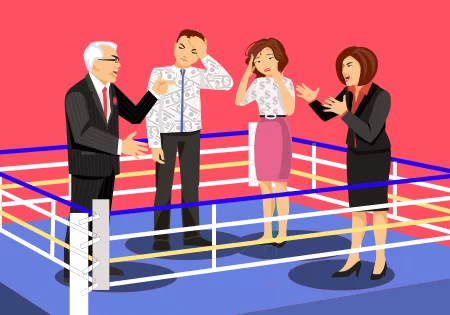
Picture this: a mediator as a conflict resolution guru, skillfully guiding discussions and helping find common ground for a win-win situation. They’re like the referee of a friendly match, keeping things fair and focused on the future.
On the other hand, when attorneys are in the mix, things can get a tad contentious as they strive to win for their respective clients, sometimes losing sight of what’s truly in their client’s and their client’s children’s best interests. A lawyer represents a client to defeat the other side and win and in family law context, this can have harmful unintended consequences for parents who must still co-parent and support children into the future.
In the end, a mediator might just be the ideal fit for your situation. However, whether you opt for mediation or not, you can still bring an attorney on board, but more as a consultant to ensure your legal matters are in your best interest.
Experienced San Diego Divorce Mediation Attorney To Get Help You Need Today
Scott F. Levin at San Diego Divorce Mediation & Family Law is a determined San Diego divorce mediation attorney who dedicates his imposing practice to successfully guiding challenging divorce cases through mediation while ensuring that his clients’ rights are well protected.
Because the outcome of your case is important to your future and because avoiding divorce litigation is almost universally beneficial, we encourage you to reach out and contact or call us at 858-255-1321 for more information about what we can do to help you today.
Begin the low-stress process with 5-Star rated Divorce Mediation Expert, Scott F. Levin, Esq, at San Diego Divorce Mediation. You’ll have access to flexible options, including virtual meetings. Reach out today to schedule a free consultation and see the difference mediation can make. By choosing mediation, you can save time, money, and emotional stress, while maintaining control over the outcome of your divorce.


